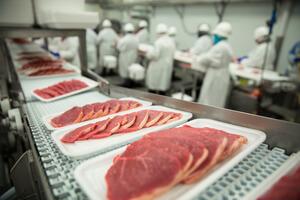
312-981-0409
33 N Dearborn St 10th Floor, Chicago, IL 60602
Serving Clients Across 7 Illinois Locations
Recent Blog Posts
5 Frequently Asked Questions About Food Poisoning
 While people may be careful to avoid eating foods that could potentially be harmful, there are a variety of situations where food poisoning may occur. Because foodborne illnesses can cause a great deal of pain and discomfort and have long-lasting effects, those who have contracted these illnesses will want to understand who was responsible, and they may be able to pursue financial compensation for their injuries and damages. Our firm works to keep people informed about issues related to food poisoning, and we regularly answer questions about these matters, including:
While people may be careful to avoid eating foods that could potentially be harmful, there are a variety of situations where food poisoning may occur. Because foodborne illnesses can cause a great deal of pain and discomfort and have long-lasting effects, those who have contracted these illnesses will want to understand who was responsible, and they may be able to pursue financial compensation for their injuries and damages. Our firm works to keep people informed about issues related to food poisoning, and we regularly answer questions about these matters, including:
How Common Is Food Poisoning?
According to the Centers for Disease Control and Prevention (CDC), around one out of every six people in the United States contract foodborne illnesses every year. Out of the people who are affected, around 128,000 become severely ill and require hospitalization, and around 3,000 illnesses are fatal.
UPDATE: Uncooked Shrimp Can Contain Harmful Bacteria

UPDATE: While the outbreak discussed below involved a brand of shrimp that was contaminated with Vibrio parahaemolyticus bacteria, there are multiple other types of foodborne illnesses that may be spread through raw or pre-cooked shrimp. These include Vibrio vulnificus, Vibrio alginolyticus, and Vibrio cholerae. Shrimp have also been found to contain bacillus bacteria, as well as salmonella and E. coli.
Consumption of food contaminated with Vibrio bacteria can lead to vibriosis. While this form of food poisoning is often mild, it can result in serious illness in some cases. Symptoms of vbriosis include abdominal cramps, nausea, fever, and chills. Vibriosis due to Vibrio vulnificus infections can be especially serious, and victims may require hospitalization and intensive care, as well as amputation of a limb. These infections result in death in around 20% of cases.
Outbreaks of Listeria Food Poisoning Linked to Packaged Salads
 There are multiple ways that people in the United States may be affected by foodborne illnesses, including food products that have been contaminated with viruses, bacteria, or other toxins. In some cases, foods can become contaminated during the production process, and this may lead to large amounts of products being sold that may put people at risk of food poisoning. Recently, two separate outbreaks of food poisoning occurred due to packaged salads that were contaminated with listeria.
There are multiple ways that people in the United States may be affected by foodborne illnesses, including food products that have been contaminated with viruses, bacteria, or other toxins. In some cases, foods can become contaminated during the production process, and this may lead to large amounts of products being sold that may put people at risk of food poisoning. Recently, two separate outbreaks of food poisoning occurred due to packaged salads that were contaminated with listeria.
Dole and Fresh Market Salads Recalled Due to Listeria Contamination
In December of 2021, the Centers for Disease Control and Prevention (CDC) became aware of a number of cases of food poisoning in which people reported infections by listeria monocytogenes bacteria. While the people in these cases reported eating packaged salads that had been purchased from grocery stores, the CDC determined that there were two separate outbreaks related to products produced by different companies.
Pork Products Recalled Because of Possible Listeria Contamination
 While the food products that are made available to consumers in the United States are expected to be safe for consumption, there are many cases where products may become contaminated with bacteria, viruses, or other toxins. When contaminations are discovered, recalls may be performed to remove products from stores and prevent food poisoning. However, consumers may still be exposed to foodborne illnesses, especially if they purchased products before they were recalled. Recently, a large number of pork products were recalled because they may have been contaminated with listeria.
While the food products that are made available to consumers in the United States are expected to be safe for consumption, there are many cases where products may become contaminated with bacteria, viruses, or other toxins. When contaminations are discovered, recalls may be performed to remove products from stores and prevent food poisoning. However, consumers may still be exposed to foodborne illnesses, especially if they purchased products before they were recalled. Recently, a large number of pork products were recalled because they may have been contaminated with listeria.
Recall of Fully Cooked Ham and Pepperoni Products
On December 5, 2021, Alexander & Hornung, a food product manufacturer in Michigan that is owned by Perdue Premium Meat Company, Inc., issued a recall of more than 230,000 pounds of meat products because they may have been contaminated with listeria monocytogenes bacteria. The recall included multiple types of cooked ham and pepperoni stick products with sell-by dates ranging from 12/10/21 to 5/24/22. These products were sold under multiple brand names, including:
Salmonella Food Poisoning Linked to Chicken Continues to Affect People in the U.S.
 Of the different types of toxic substances that can lead to food poisoning, salmonella is one of the most common. This bacteria is often spread through raw poultry, and unfortunately, agricultural practices in the United States can significantly increase the risks of chicken being contaminated. Government agencies often lack the power and resources to enforce regulations and ensure that food product manufacturers are following the correct safety procedures, and this has caused thousands of people to contract dangerous infections and suffer serious injuries.
Of the different types of toxic substances that can lead to food poisoning, salmonella is one of the most common. This bacteria is often spread through raw poultry, and unfortunately, agricultural practices in the United States can significantly increase the risks of chicken being contaminated. Government agencies often lack the power and resources to enforce regulations and ensure that food product manufacturers are following the correct safety procedures, and this has caused thousands of people to contract dangerous infections and suffer serious injuries.
Industry Practices Lead to the Spread of Salmonella
In 2018, the Centers for Disease Control and Prevention (CDC) investigated an outbreak of salmonella food poisoning that affected more than 100 people in 32 different states. This particular strain of salmonella was known as multidrug-resistant infantis. It caused people to suffer serious illnesses, and it was not affected by the antibiotics usually used to treat these types of infections. The CDC closed the investigation in 2019, but people continued to be infected, and this strain of salmonella is still present in the food supply in the United States. In fact, the CDC has noted that it is responsible for between 11,000 and 17,000 illnesses every year.
Salmonella Outbreak Affecting Hundreds of People Linked to Onions
 There are multiple types of food products that may become contaminated, leading to food poisoning. While government organizations such as the Centers for Disease Control and Prevention (CDC) and the Food and Drug Administration (FDA) monitor food products in the United States for safety, there are many cases where foods that are contaminated with harmful bacteria or viruses are sold to consumers. In one of the most recent food poisoning outbreaks, onions imported from Mexico have caused hundreds of people to become infected with salmonella.
There are multiple types of food products that may become contaminated, leading to food poisoning. While government organizations such as the Centers for Disease Control and Prevention (CDC) and the Food and Drug Administration (FDA) monitor food products in the United States for safety, there are many cases where foods that are contaminated with harmful bacteria or viruses are sold to consumers. In one of the most recent food poisoning outbreaks, onions imported from Mexico have caused hundreds of people to become infected with salmonella.
Recalls of Onions and Related Products Due to Salmonella Contamination
Starting in September of 2021, the CDC identified an outbreak of infections of the Salmonella Oranienburg bacteria. This outbreak was linked to whole, fresh onions that were imported to the United States from Mexico. As of October 28, 2021, more than 800 infections have been reported in 37 states and Puerto Rico, and these infections have resulted in at least 137 hospitalizations. Illinois has been one of the most affected states, with 47 cases reported so far. Since the investigation is ongoing, and determining whether an illness is related to this outbreak may take multiple weeks, it is likely that many more people will be affected by this outbreak.
Can Baby Formula Cause Necrotizing Enterocolitis in Newborns?
 Newborn infants are very vulnerable, and they may suffer harm due to infections or other health issues. Necrotizing enterocolitis (NEC) is one issue that can affect children who are born prematurely or who have a low birth weight. This intestinal illness can be incredibly harmful, and it may threaten an infant’s life or lead to life-long medical conditions. In some cases, it may be caused by an E. coli infection or the use of baby formula in a neonatal intensive care unit (NICU).
Newborn infants are very vulnerable, and they may suffer harm due to infections or other health issues. Necrotizing enterocolitis (NEC) is one issue that can affect children who are born prematurely or who have a low birth weight. This intestinal illness can be incredibly harmful, and it may threaten an infant’s life or lead to life-long medical conditions. In some cases, it may be caused by an E. coli infection or the use of baby formula in a neonatal intensive care unit (NICU).
Symptoms of NEC
Necrotizing enterocolitis affects the lining of the small or large intestine, and it may cause intestinal tissue to die. In some cases, a hole may develop in the intestinal wall, causing foods and liquids to leak into the abdomen and leading to widespread infections or sepsis. Dead intestinal tissue may need to be removed, or a child may experience intestinal blockages or other issues that will affect their ability to digest food throughout the rest of their lifetime.
When Can Food Poisoning Cause Reactive Arthritis?
 When a person contracts food poisoning after eating foods that are contaminated with bacteria, viruses, or other toxins, they may experience multiple types of health issues. In addition to suffering from the effects of a foodborne illness, a person may experience other complications that can affect their health and well-being. Reactive arthritis is one of the most serious of these complications, and it can cause significant pain and discomfort while affecting a person’s ability to work and manage their daily activities.
When a person contracts food poisoning after eating foods that are contaminated with bacteria, viruses, or other toxins, they may experience multiple types of health issues. In addition to suffering from the effects of a foodborne illness, a person may experience other complications that can affect their health and well-being. Reactive arthritis is one of the most serious of these complications, and it can cause significant pain and discomfort while affecting a person’s ability to work and manage their daily activities.
What Is Reactive Arthritis?
While the causes of reactive arthritis are not fully understood, it is believed to be an autoimmune disorder that occurs because the body’s immune system attacks healthy tissues. While reactive arthritis is relatively rare, it can occur as part of the body’s response to gastrointestinal infections, including foodborne illnesses that occur because of salmonella, campylobacter, shigella, and yersinia.
McHenry County Mexican Restaurant Linked to Salmonella Outbreak
 Food served to customers at restaurants can become contaminated in multiple ways, and in these cases, people can suffer serious illnesses due to food poisoning. While there are many different types of bacteria, viruses, or other substances that can make foods dangerous, salmonella is one of the most common sources of foodborne illnesses. People may become infected with this type of bacteria if they eat meat that is not cooked properly, and the bacteria may also be spread if a restaurant employee does not wash their hands, if preparation surfaces and utensils are not sanitized correctly, or if food is not refrigerated or stored properly. Recently, multiple people in McHenry County contracted food poisoning due to salmonella, and this outbreak was linked to a Mexican restaurant in Fox River Grove.
Food served to customers at restaurants can become contaminated in multiple ways, and in these cases, people can suffer serious illnesses due to food poisoning. While there are many different types of bacteria, viruses, or other substances that can make foods dangerous, salmonella is one of the most common sources of foodborne illnesses. People may become infected with this type of bacteria if they eat meat that is not cooked properly, and the bacteria may also be spread if a restaurant employee does not wash their hands, if preparation surfaces and utensils are not sanitized correctly, or if food is not refrigerated or stored properly. Recently, multiple people in McHenry County contracted food poisoning due to salmonella, and this outbreak was linked to a Mexican restaurant in Fox River Grove.
El Sombrero Restaurant Closed Due to Salmonella Outbreak
Salmonella Food Poisoning Outbreak Linked to Italian-Style Meats
 Foodborne illnesses are an ongoing concern for people in the United States. Multiple types of diseases may be spread through contaminated foods, and products are often recalled because they have been found to contain harmful viruses, bacteria, or other toxic substances. Salmonella is one of the most common sources of food poisoning, and it can cause serious health issues for those who are infected. One of the most recent outbreaks of food poisoning due to salmonella involved prepackaged Italian-style meats.
Foodborne illnesses are an ongoing concern for people in the United States. Multiple types of diseases may be spread through contaminated foods, and products are often recalled because they have been found to contain harmful viruses, bacteria, or other toxic substances. Salmonella is one of the most common sources of food poisoning, and it can cause serious health issues for those who are infected. One of the most recent outbreaks of food poisoning due to salmonella involved prepackaged Italian-style meats.
Fratelli Beretta Meats Recalled Due to Salmonella Contamination
From May to July of 2021, people in multiple states reported salmonella infections after eating meats in products manufactured by Fratelli Beretta. Illnesses were reported in 17 states, with the most cases occurring in Illinois, California, and Arizona. After an investigation by the Centers for Disease Control and the U.S. Department of Agriculture’s Food Safety and Inspection Service, Fratelli Beretta issued a recall of Uncured Antipasto trays.
-

Foreclosure and Bankruptcy
Visit Website -

Real Estate and Estate Planning
Visit Website -

Personal Injury
Visit Website

 Spanish
Spanish Cantonese
Cantonese















